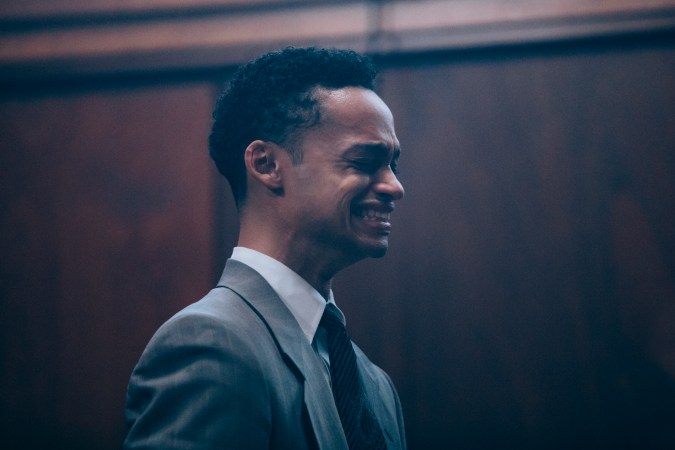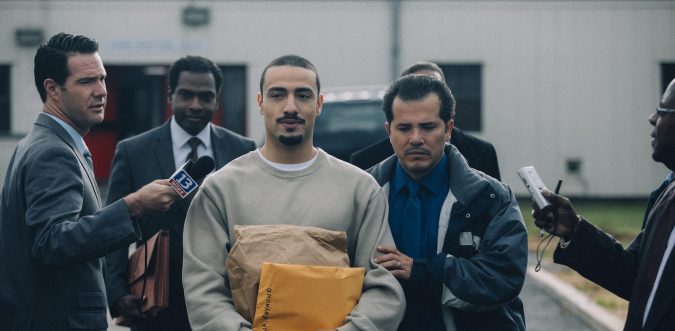Through a humanizing look at the victims of a disgustingly racist justice system, Ava DuVernay’s scripted retelling of the 1989 Central Park Five case, When They See Us, is faithfully true to its title. Instead of reiterating facts that have been documented in nonfiction work before, her take on the incident goes beyond the degrading headlines of the time and focuses on painting a portrait of the men at the center of this story — one that colors in the details and provides nuance.
The expansive fictionalized miniseries gives the director the space and emotional arsenal to reckon with the traumatic ordeal faced by the five individuals — four African-American and one Latino — who as young teenagers were accused of raping a white woman who was out jogging that night. “Animals” who were “wilding out” is how prosecutor Linda Fairstein (Felicity Huffman) shamelessly referred to them.
Nuyorican Raymond Santana Jr. (played first by Marquis Rodriguez) is one of many kids who were out that evening, and one of the unlucky ones whose name came up in an investigation that had found its perpetrators before it even began. DuVernay, who is also the writer of the four-part series, gives care in accurately depicting unique issues that affect the Latino community, and that influence how this nightmare unfolded for Santana in particular.
When first questioned as a 14-year-old, Raymond’s grandmother, who doesn’t speak English, was the only who could be by his side. His father, Raymond Santana Sr. (superbly portrayed here by John Leguizamo), couldn’t miss work to be there, as he feared losing his job if he took time off. Raymond’s grandmother couldn’t understand the outrageously inappropriate inquiries and threats authorities were making in English – and detectives, one of whom is presumably Latino, take advantage of the situation and fabricate a narrative that paints Raymond as a vicious offender.

Plenty of Latinos born to immigrant parents know the feeling of having to serve as translators, to fend for themselves in situations where their parents are unequipped to offer support because of the language barrier, or because economic hardships prevent their guardians from being intensely involved in their affairs. For Santana, it was the worst case scenario of a situation familiar to many.

Over the course of the first two episodes, which deal with the coerced confessions and trial bungled by Santana’s mostly inept lawyer, Peter River (Christopher Jackson), the Latino perspective is present only as part of the part of the communal experience all the families are going through, as life as they know it begins to fall apart.
It’s during the trial, however, where Leguizamo’s Santana Sr. appears arguing with a reporter covering for Spanish-language press at the trial. The distressed working-class father demands they stop spreading lies about his son, following Trump’s costly ads across four New York newspapers calling for the death penalty for the five wrongly accused teens. Then and now, youth of color are treated as predators at a tender age, while college-aged white men consistently get away with a slap on the wrist when facing rape charges.

For the third part, DuVernay dives into the Santana family’s story: from the grandmother’s guilt over her powerlessness, to relatives blaming the boy for dishonoring them, and, more significantly, Raymond Sr.’s conflicted, yet unwavering support in the form of constant phone calls that serve as lifeline for his son. Leguizamo remains in that role throughout, but as the years go by in the story, Rodriguez is replaced by Freddy Miyares as the adult version of Raymond Santana Jr.
Prison time is a minimal aspect of When They See Us, likely a deliberate choice on DuVernay’s part to not replicate the same images the media perpetuates about men of color. The bulk of the series is spent piecing together the inner lives of these families in the wake of theirs children’s release — at least for four of them — several years after their initial conviction.
Miyares thoroughly embodies Santana Jr. as he returns to the world he once knew, but now with a set of new burdens on his back. Although his father’s endless affection for him is never questioned, Raymond understands circumstances have changed. Santana Sr. has a young child and has married a woman who doesn’t believe Raymond is innocent.


Frustration takes over when realizing he is free but still trapped under the label of being a felon and even worse, a sex offender. Resorting to criminal activity remains the most viable escape for him. Raymond’s decision to deal drugs is neither judged nor condoned, but presented as an obvious outcome for a man who’s been pushed deep into the margins of society.
In addition to the Santana household’s family dynamics that ring true, DuVernay imbues Raymond’s character with subtle manifestations of trauma, and the perpetual self-defense mode men like him live in even after leaving prison: like showering with boxers on at home. Thankfully, there’s hope in the form of a potential relationship and a regained sense of worth once the truth begins to peak out from behind the bleak shadows of the racism that nearly destroyed his life.
Exquisitely shot and scored by artists of color (cinematographer Bradford Young and composer Kris Bowers), When They See Us is always compassionate toward the Central Park Five, who through DuVernay’s miniseries regain their humanity on screen, and might finally be truly seen for who they are, and not for what others said they did.
With little reservations, this may stand as the best project DuVernay has ever pulled off in terms of scope and impact. When They See Us will leave you in a confused state: shaking in anger when faced with more gut-punching evidence that injustice can run so rampant for marginalized people in this country, and simultaneously invigorated with the knowledge that these men managed to reshape their destinies even after being dragged through the mud of public opinion. Let your tears wash away the pain, and clear the path for all of us to fight harder.
When They See Us launches May 31 on Netflix.




